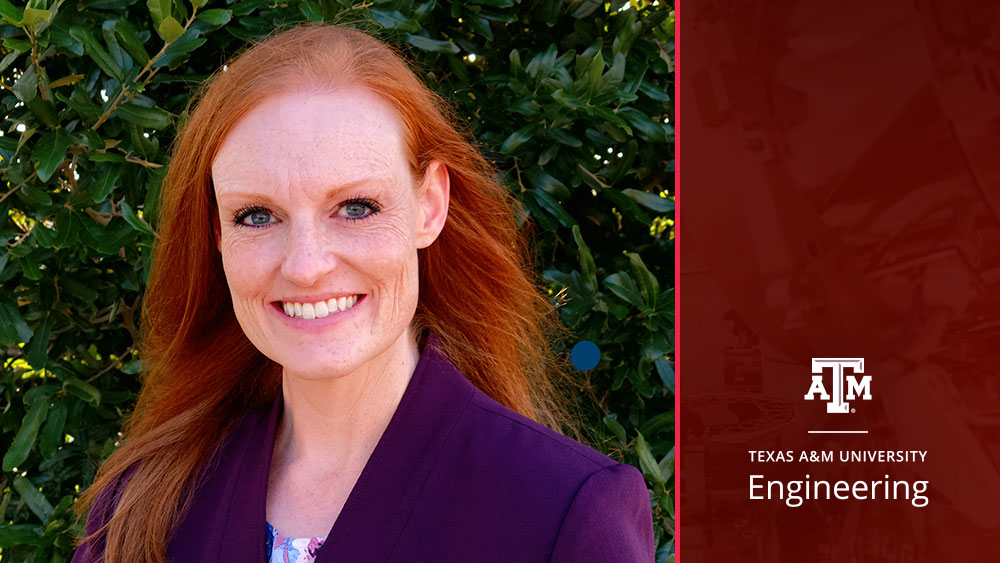
Peruse the graduate interdisciplinary engineering course classroom, and you'll find a wide variety of students: post-undergraduates, professionals with a few years of industry experience, and those who have spent most of their adult lives in an office. Andrea Porter is the latter. Last spring, 20 years into her career, she decided to pursue a lifelong dream of applying to graduate school for a doctoral degree.
Porter is a second-year Doctor of Philosophy of Interdisciplinary Engineering graduate student in the Department of Multidisciplinary Engineering. She is one of three recipients of this year's 3M Personal Safety Division (PSD) Occupational Health and Safety Scholarship.
This scholarship recognizes outstanding graduate students pursuing studies in occupational health and safety or industrial hygiene programs at universities in the United States. Recipients are chosen for high academic achievement and professional experience.
The 3M occupational health and safety professionals’ selection committee chose Porter and two other graduate students out of 48 national applicants. As part of her application process, she wrote about her interest in leveraging marketing to better engage the workforce in safety practices. Porter received $5,000 towards the cost of completing her degree.
"Making a mid-career, life-changing decision to enter a doctoral program is a big leap of faith," she said. "Receiving this scholarship from 3M is truly an honor; it validates my belief that I’m on the right path."
From a '9-to-5' to a college student schedule
Out of high school, Porter set out to work at the intersection of marketing and science – not in product development and sales – but rather in bridging the gap between a technical and non-technical audience. She has a bachelor's degree in advertising and public relations with a strong mathematics background. She received a master's degree in engineering management and a marketing management graduate certificate from Harvard University.
Self-described as a non-traditional student, Porter was in her 10th year as the director of extended studies at West Texas A&M University when she decided to return to school.
"My husband and I decided it was time for me to apply to Ph.D. programs. It was one of my dreams to see if I could gain admission to Texas A&M. I was accepted, and we suddenly had big decisions to make."
Several moving pieces quickly fell into place for Porter and her husband. "Through various connections at work, a small, rural school district asked my husband to apply and interview for a job. It was the perfect opportunity, so with that God-given blessing, we moved downstate to College Station last August."
While unsure of what to expect when her first graduate semester began, she quickly settled into the multidisciplinary engineering department.
"Coming to Aggieland mid-career has been an amazing experience and better than I could have hoped," Porter said. "Even though I'm at least a decade older than everyone else in the classroom, age has never mattered. It's wonderful to be a college student again. I highly recommend it to anyone who needs a change or is experiencing a mid-life crisis. Forget buying a sports car – go back to college for a degree! The experiences and memories will last much longer than the car."
Outside of the classroom, Porter is whole-heartedly embracing the new lifestyle of her unusual mid-career move. She’s found the return to student life delightfully rejuvenating, even with the challenges of graduate coursework. One of her goals is to fully embrace the university opportunities offered to students.
"The best thing about returning to school, which I never considered before, is having the college student schedule again,” she said. “There are so many activities, groups, lectures and studies to participate in that are more challenging to add to your schedule when you’re working full-time. There’s also an enormous amount of built-in exercise, from walking on campus, riding a bike and even taking swimming lessons for the first time. Being around younger people is remarkable because I feel younger. I've thought often, 'Oh, I'll do all these things someday,' and someday is finally here. It’s rewarding to see the work we put in to get to this point is paying off."
Porter credits her husband’s encouragement to pursue graduate school and move to Aggieland.
"He's known this has been a lifelong dream, and he's thrilled I'm getting to do it. I couldn't do it without him and his support. A big shout out to him because he helped make it happen!"
During her doctoral studies, Porter hopes to research ballistic vests — also known as bulletproof vests – fitted specifically for women. While she does not have previous military or police experience, Porter is interested in improving female body armor. Though ballistic vests exist for women, much of the body armor market remains designed for men.
"As more women enter roles in the military, the police force or security, they need ballistic vests for safety,” shared Porter. “Even more importantly, women should be comfortable in their body armor without potentially suffering from musculoskeletal problems because of the constant wear."
The average ballistic vest is designed with flat front plates, which can create numerous fit issues, making it difficult for women wearing these vests to move their arms.
"Vests with flat front plates push breast tissue out into the armpits," she said. "It's then harder for the wearer to drive or prepare to shoot, which can lead to discomfort and pain. The vest length, typically designed longer for a male torso, can also interfere with the positioning of duty belts."
Porter currently works at an internship at Pantex Plant, the nation’s primary assembly, disassembly, retrofit and life-extension center for nuclear weapons. Pantex Plant is a part of the National Nuclear Security Administration, a U.S. Department of Energy agency. As an intern, she works with the human factors group, which observes and studies physical and cognitive ergonomics, such as how tasks are completed safely and correctly.